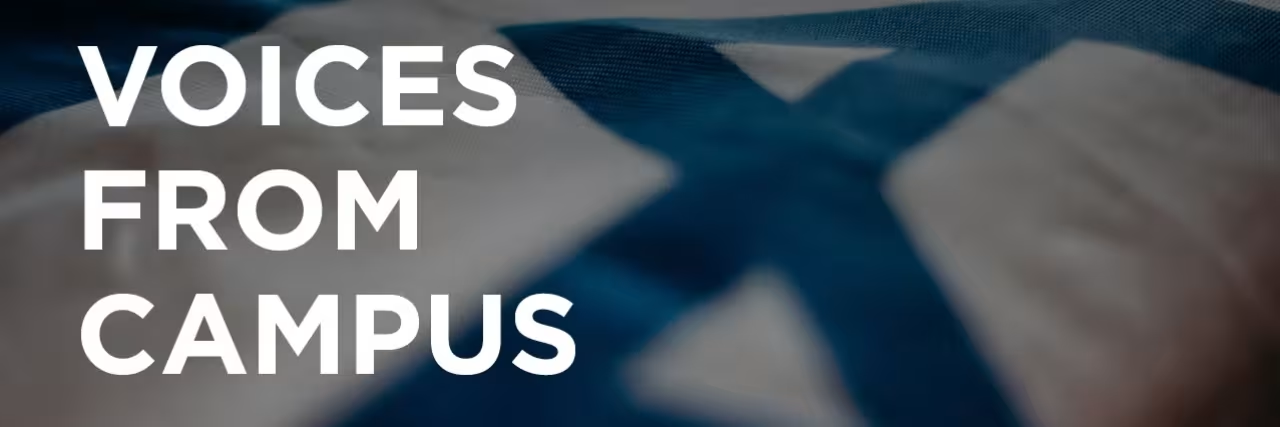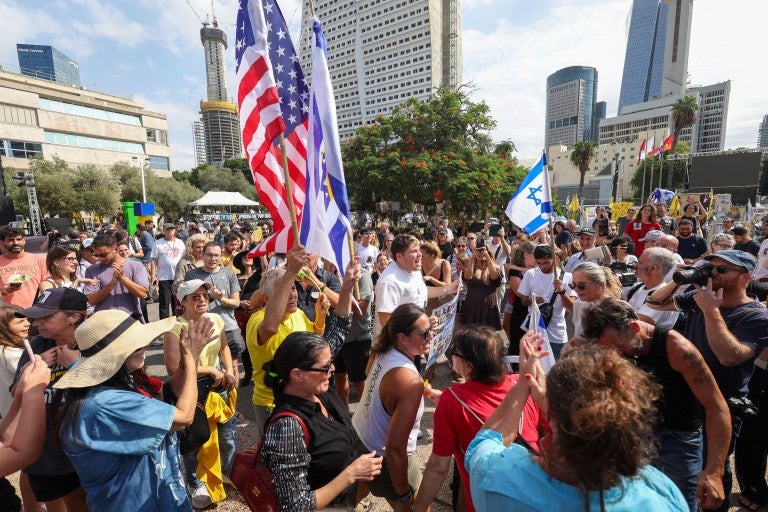November 5, 2025
Adriana Bussel-Alonso
Tufts University ‘27, CGB Member
Daniel Solomon
Brown University ‘26, CGB President
Gaby Bonwitt
Emory University ‘26, CGB Member
Malcolm Furman
Brown University ‘27, CGB Member
Sophie Kalmin
Emory University ‘26, CGB Member
Surrounded by members of the French and American militaries saluting flags whipping in the wind, World War II veterans overlooking the beaches they stormed 81 years ago, and civil society leaders with their hands over their hearts, we, American & French Jewish students and young professionals, listened to the sole bugler play “Taps.” When our AJC student delegation was seated at the 2025 annual D-Day commemoration at the Normandy American Cemetery Memorial, we didn’t anticipate how strongly the ceremony would resonate with the current moment. For some of us, a grandparent fought in the war but rarely spoke about it. For others, our grandparents were born afterwards, in the shadows of the Holocaust and in the wake of modern Israel’s establishment. For all of us, the liberation of Europe from the Nazi regime felt distant. Yet, as U.S. former Special Envoy to Monitor and Combat Antisemitism Deborah Lipstadt led our group in reciting the Mourner’s Kaddish over one of the graves marked with a Jewish Star of David, we realized that this mission was about much more than a distant past – it was about this moment for world Jewry.
Among the endless rows of white crosses at the Cemetery, the weight of collective memory pressed heavily — both American and Jewish. While the D-Day ceremony honored the past, it also impressed upon us the urgency to stand up for democracy and freedom today. While today’s threats are different in nature and scale, the moral imperative they call forth remains unchanged. Democratic institutions on both sides of the Atlantic were founded on principles of protecting their flourishing and diverse societies. As Thomas Jefferson once warned, “The price of freedom is eternal vigilance.” Vigilance is the story of the Jewish people, from the resilience of Esther in the Persian kingdom to the Soviet pogrom survivors of the 20th century.
This feeling was first catalyzed the day before at the inaugural AJC and Conseil Représentatif des Institutions Juives de France (CRIF) forum titled On the Frontlines: The French-American Forum on Antisemitism, and endures today. Convened at Sciences Po – an elite social and political science institution in Paris – students, diplomats, pundits, and young professionals gathered in conversations that transcended both borders and generations. Some moments were sobering. Amb. Lipstadt warned that antisemitism embodies yet exceeds bigotry—it’s a conspiracy theory that corrodes democracy itself. Led by Professor Pamela Nadell and Amb. Lipstadt, our debrief over Shabbat was intimate, where French and American Jewish students traded stories of campus antisemitism and reflected on what it means to be part of a global Jewish people.
Our overall takeaway was a nuanced portrait of two diaspora communities facing parallel threats with different frames of reference. Though our legal systems differ, French and American Jews alike grapple with balancing commitments to robust free speech protections and combating hateful rhetoric in the public square.
University leaders who spoke at the conference emphasized this point. Chancellor Andrew Martin of Washington University in St. Louis (WashU) distinguished between acceptable protest and encampments that clearly violate institutional codes of conduct. Science Po Director Luis Vassy, who formerly served as the French Ambassador to the Netherlands, explained French legal and structural constraints, which prevent expulsion and require disciplinary action to go through robust student-faculty panels. Both university leaders expressed a commitment to free expression for the sake of intellectual discussion — but with clear lines prohibiting undue harassment of students.
Yet the conversations weren’t solely about strategy, historical context, or policy. They also centered joy – one of the core values of AJC’s Campus Global Board. Ambassador Lipstadt urged us to “live as Jews” not in reaction to antisemitism, but in celebration of Jewish identity. Eric Ward, an American civil rights advocate centered on coalition building, reminded attendees that “allyship is the antidote to despair.” Rigorous discussion across the diverse diaspora – which is, indeed, central to our Jewish tradition – pushed participants to consider not only how we can work to combat all bigotry, but how we can form transatlantic partnerships to do so.
The forum sharpened our understanding of what makes antisemitism distinct—its conspiratorial nature, its historic longevity, and its adaptability. It deepened our commitment to resisting not just through outrage, but with specific action items including education, coalition-building, and finding the “joy” amidst the “oy,” a concept that Amb. Lipstadt coined and highlighted throughout our Shabbat discussions. And it made one thing clear: resilience requires proactivity. It means asking hard questions about institutional blind spots, inter-community dynamics, and the futures students want to build.
As we return to campus, we carry much more than the notes we took from the remarkable advocates, diplomats, and scholars throughout the trip. Our sense of responsibility has grown towards each other, to Jews across the world, and to the American and French democratic institutions that shape our lives — the same ones that we one day hope to shape. These systems remain our most powerful tools against bigotry and injustice. And above all, we are reminded that Am Yisrael Chai. The Jewish people live – with remarkable resilience and enduring impact – now and forever more.
AJC’s Campus Global Board is entering this school year with a sharper understanding of what defending democratic values truly looks like.


